10 Ways to Teach Children Social Skills
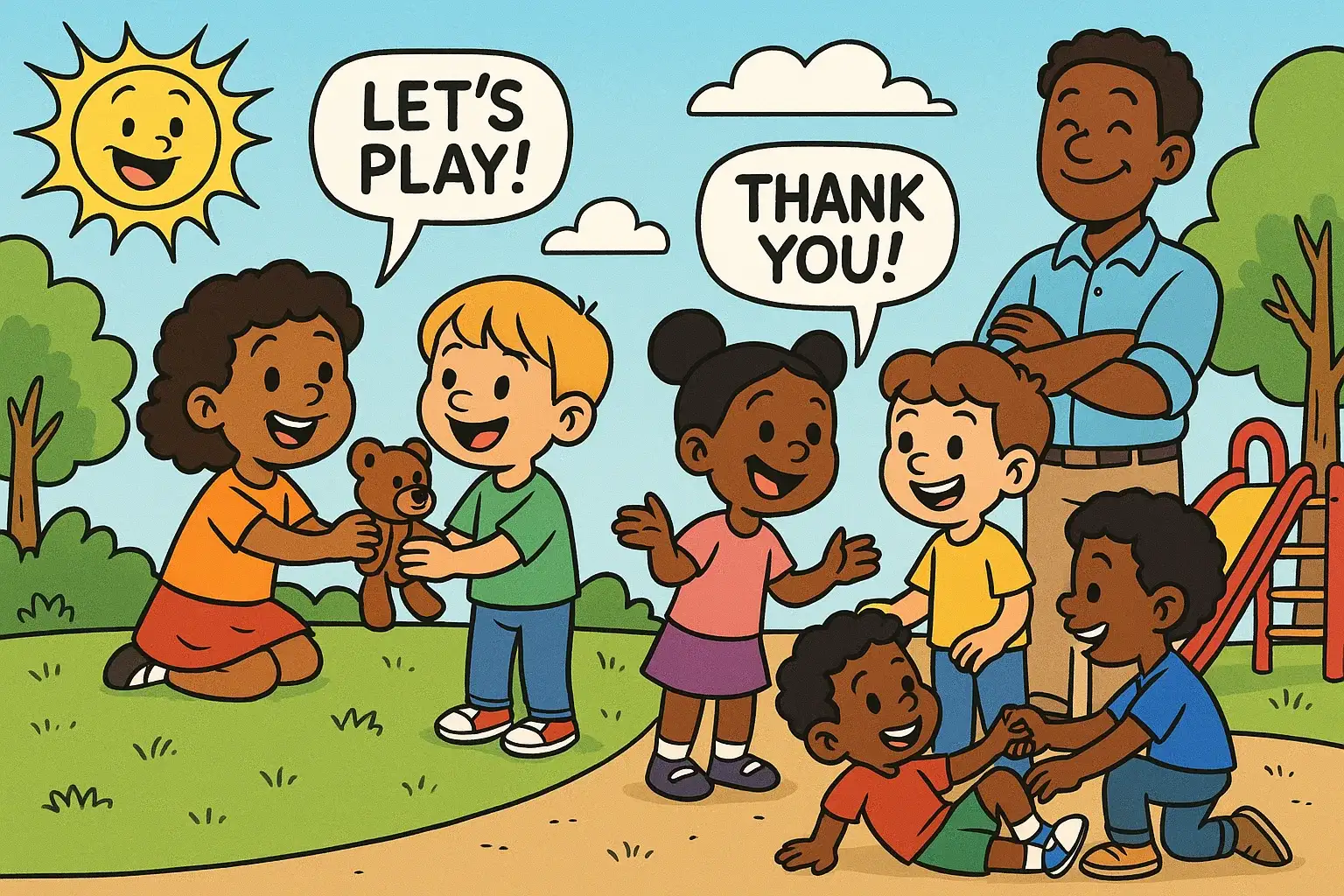
Developing social skills is a critical part of child development, laying the foundation for healthy relationships, effective communication, and emotional well-being. Helping children learn to navigate social situations with confidence is one of the most important roles a parent or caregiver can have. From early childhood through their school years, there are many evidence-based ways to encourage and teach these essential life skills.
These tips to help your child build the social-emotional skills necessary to thrive are designed to be integrated into your daily life. The goal is to foster social connections and build a strong foundation for your child’s communication skills.
1. Model Positive Social Behavior in Daily Routines
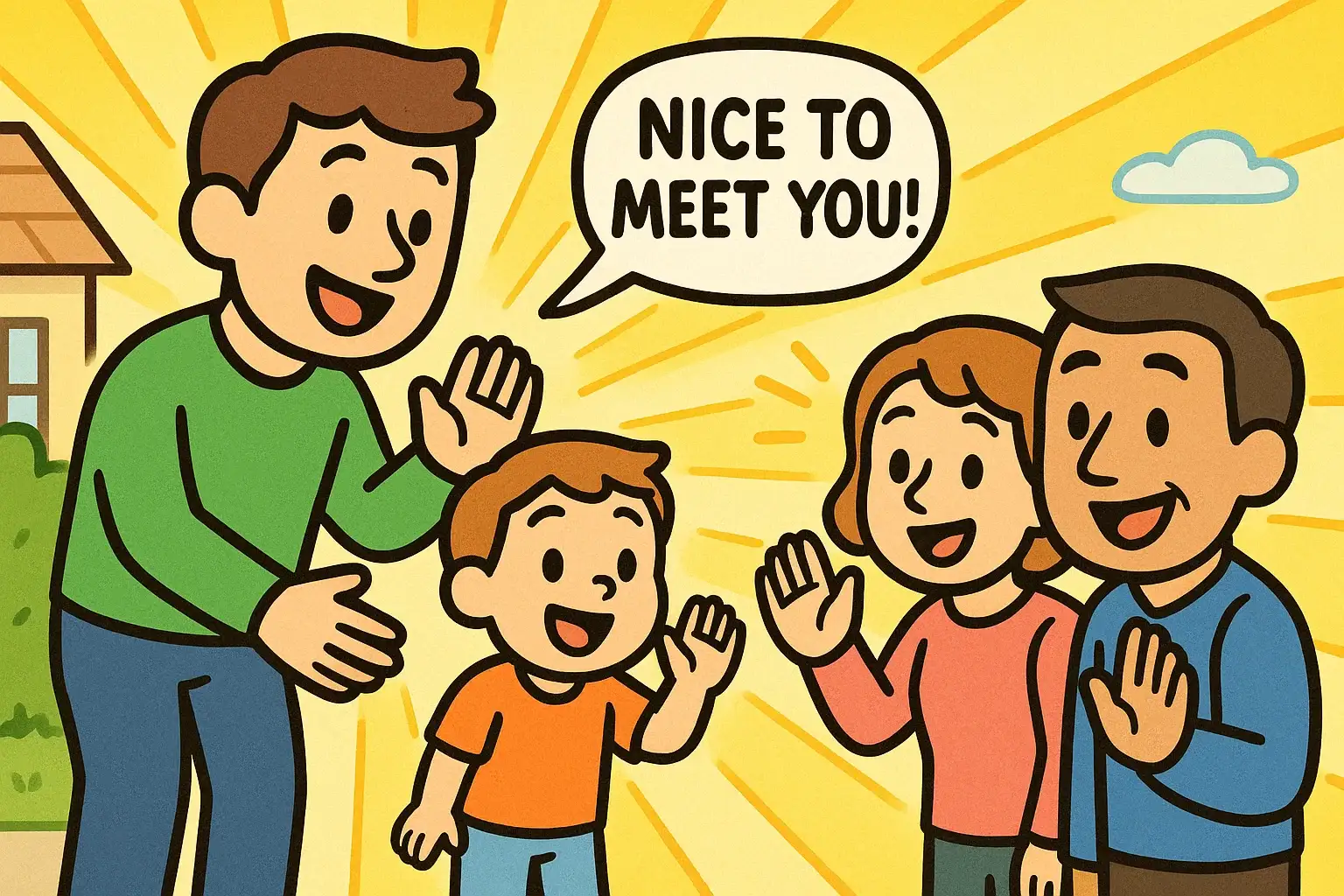
Children are keen observers, and they learn a great deal by watching the adults around them. Your everyday interactions are powerful social skills lessons.
- Demonstrate Key Skills: Make a conscious effort to model behaviors like making eye contact, using “please” and “thank you,” and practicing active listening. This helps children understand the basics of polite and respectful verbal communication.
- Narrate Your Actions: Talk about your social thinking out loud. For instance, you might say, “I’m going to hold the door for this person because that’s a kind thing to do.” This narration helps make the underlying social reasoning visible to your child.
- Encourage Observation: Prompt your child to notice social cues in others. You could say, “Look how our friend is smiling. I think they’re happy to see us,” or “Did you see how those children took turns on the slide? That was great teamwork.”
2. Use Role-Play to Rehearse Real-Life Situations
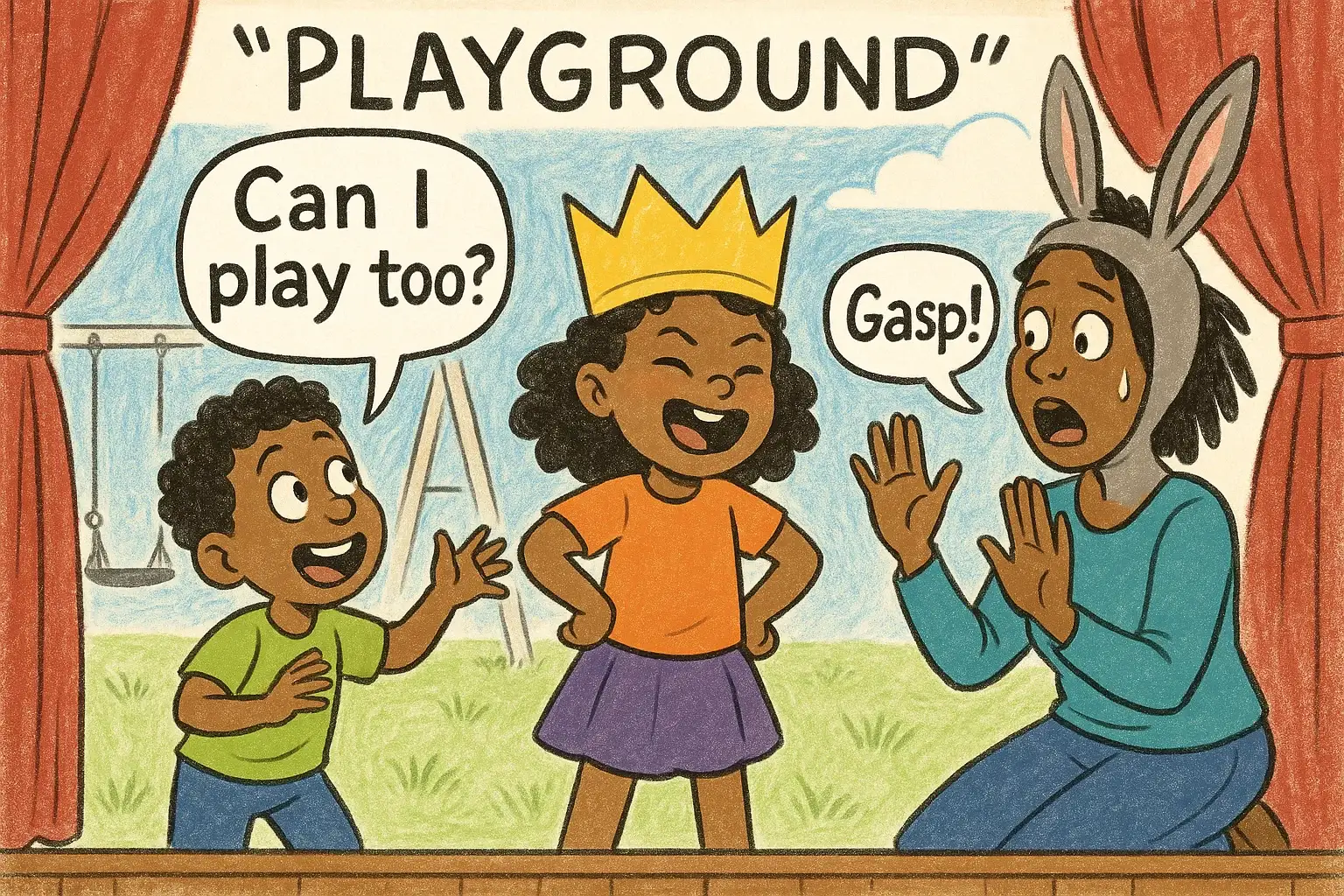
Role-playing is a safe and effective way for children to practice their social skills without the pressure of a real-life situation. This technique can build confidence, especially for kids with social anxiety, and prepare them for various social encounters.
Start with common scenarios, such as:
- Joining a group of kids at the playground
- Asking another child to play
- Apologizing for a mistake
- Resolving a disagreement over a toy
Using simple social scripts can be particularly helpful for younger children or those who need more structure. For example, you can practice the steps of joining a game: walk up, watch what they’re doing, and then ask, “Can I play too?” Over time, as your child becomes more comfortable, you can move toward more spontaneous and less-scripted role-playing. This is one of the best ways to help a child to make friends.
3. Encourage Pretend Play for Empathy and Cooperation
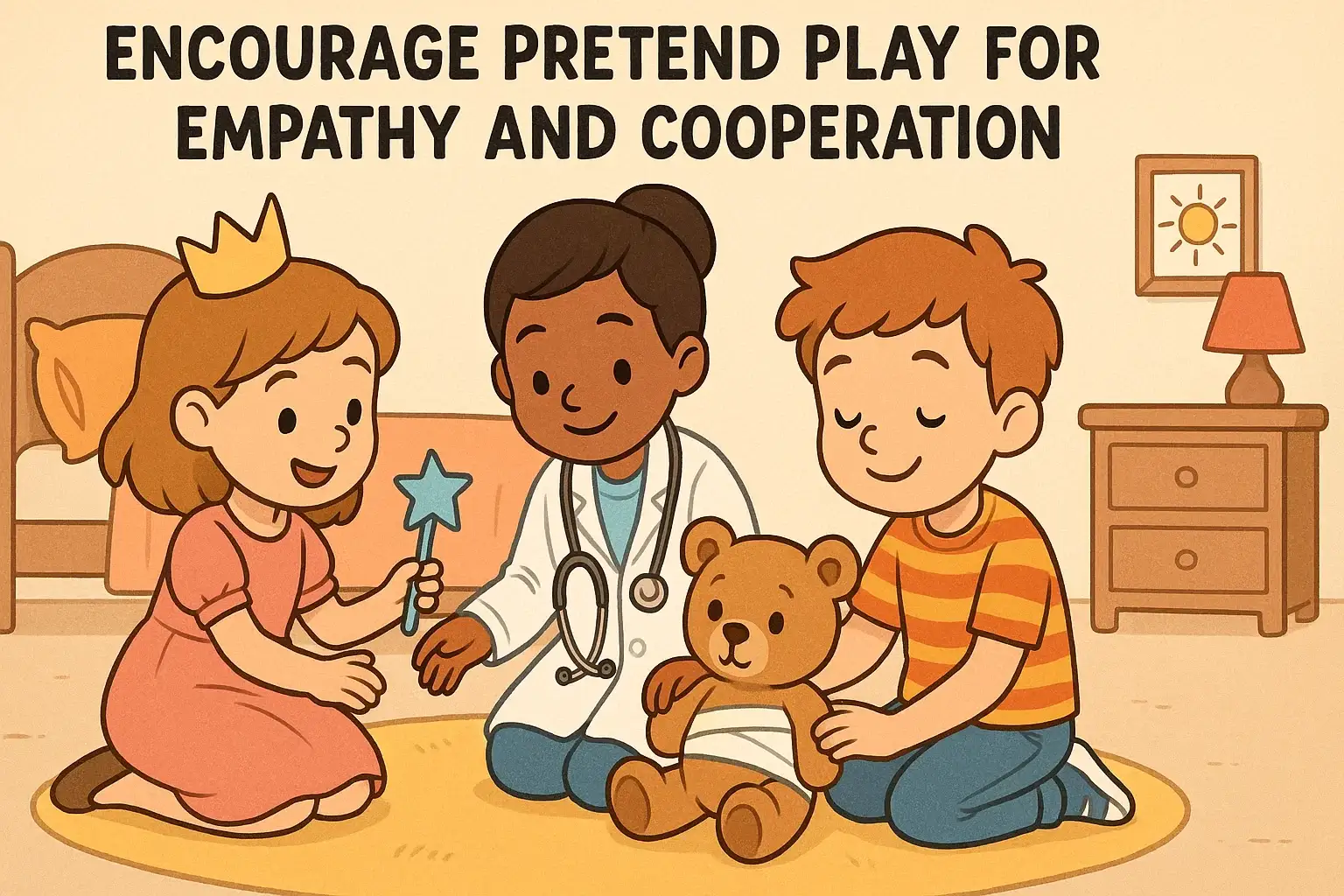
Imaginative play is a cornerstone of social-emotional development in early childhood. When children engage in pretend scenarios, they are actively experimenting with social roles and emotions. These fun activities involve teamwork and are great ways for kids to develop empathy.
- Explore Different Perspectives: Activities like playing “doctor” or “school” allow children to step into someone else’s shoes, which is a fundamental aspect of developing empathy.
- Foster Teamwork: Cooperative pretend play requires children to negotiate roles, share ideas, and work together toward a common goal. This helps build essential cooperation skills.
- Switch Roles: Encourage children to switch characters during play. A child who has been the “teacher” can then become the “student.” This practice helps them understand different points of view and promotes flexible thinking.
4. Play Turn-Based Games to Build Patience and Fairness
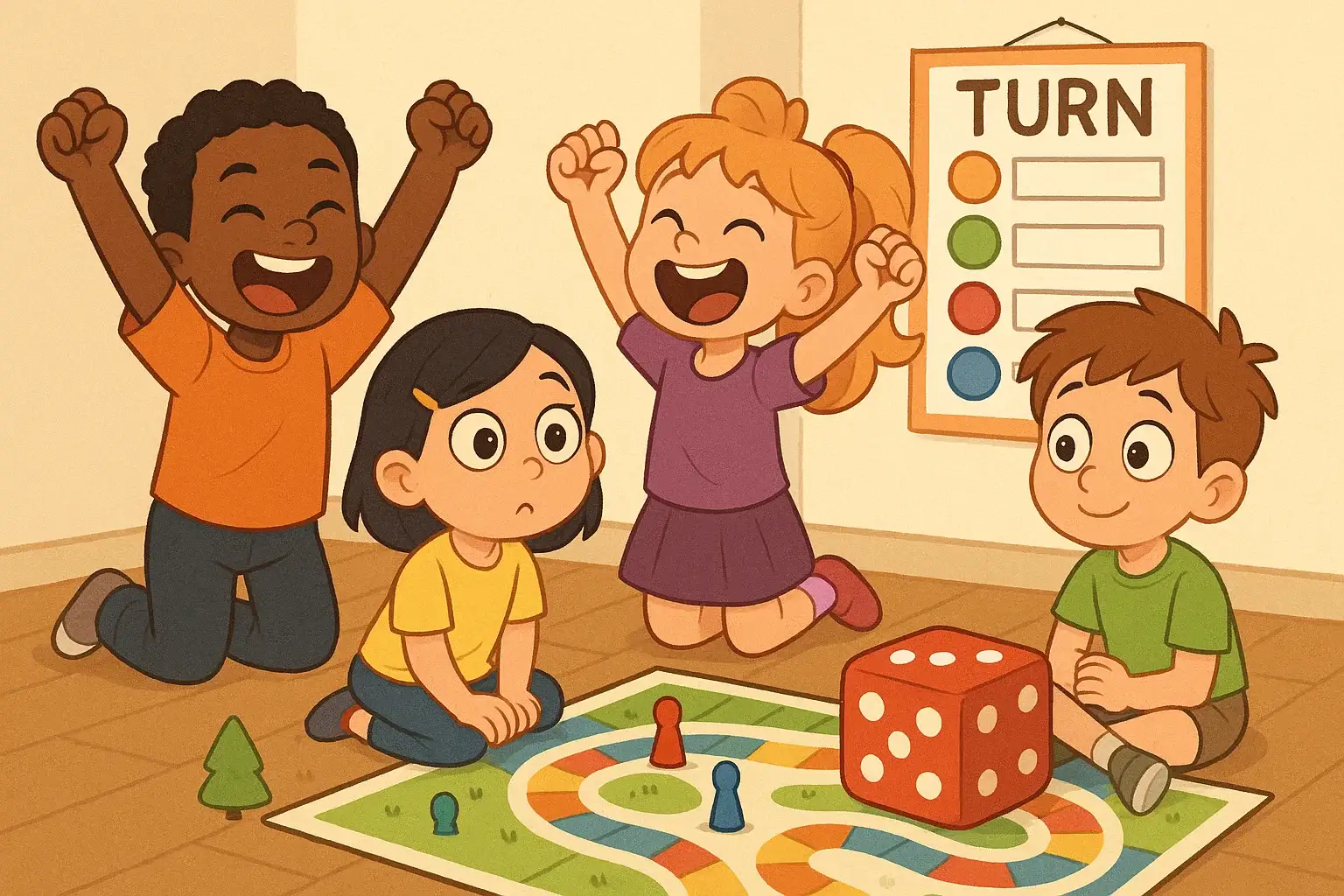
Games with clear rules and turns are excellent for teaching important social skills like patience, fairness, and how to handle both winning and losing. Children as young as three can begin to learn these concepts through simple games.
| Game Type | Social Skills Developed | Examples |
| Board Games | Turn-taking, following rules, managing disappointment | Candyland, Chutes and Ladders, Zingo |
| Active Games | Listening, self-control, paying attention to others | Simon Says, Red Light Green Light |
Using a visual timer or a “turn chart” can be especially helpful for preschoolers to understand when their turn is coming up. These structured social skills activities provide a concrete way to help children take turns and respect the rules of social engagement.
5. Teach Emotion Recognition and Expression
Understanding and managing feelings is a key emotional skill. You can help your child develop emotional literacy through engaging activities that help kids learn to recognize emotions in themselves and others.
- Emotion Cards and Games: Use flashcards with different facial expressions and play games like “emotion charades” to help children identify and label feelings like happy, sad, angry, and surprised.
- Discuss Characters in Books and Videos: When reading a book or watching a show, pause to talk about how the characters might be feeling. Ask questions like, “How do you think he feels right now? What makes you say that?” This helps children connect emotions to specific situations.
- Label Their Own Emotions: Help your child find ways to express their feelings by saying, “It looks like you’re feeling frustrated because your tower fell down.” This validates their experience and builds their emotional vocabulary, which is crucial for emotional development.
6. Promote Cooperative Group Tasks
Working together on a shared project is a fantastic way to foster teamwork, communication, and mutual respect. Unlike competitive activities, cooperative tasks emphasize the success of the group, which is a concept many children find rewarding.
Some ideas for cooperative activities include:
- Building a large fort with blankets and pillows
- Working together on a large puzzle
- Creating a collaborative art project, like a mural
- Planting a garden together
During these activities, you can encourage children to rotate roles and responsibilities. This helps them appreciate the contributions of each member and understand that working together can lead to better outcomes. These activities also teach valuable problem-solving skills.
7. Reinforce Positive Behavior with Praise and Rewards
When you see your child using a positive social skill, acknowledge it right away. This positive reinforcement makes it more likely they will repeat the behavior.
- Be Specific with Praise: Instead of a generic “good job,” be specific about what you liked. For example, say, “I saw you share your truck with your friend. That was very kind and made him so happy.” This helps your child understand exactly what they did well.
- Use Visual Rewards: For younger children, sticker charts or a “kindness jar” where you add a marble for each act of kindness can be great visual reminders of their progress.
- Focus on Effort: Praise the effort, not just the outcome. You might say, “You worked really hard to solve that disagreement peacefully.” This encourages perseverance in developing social skills.
8. Read Books That Highlight Social Challenges and Solutions
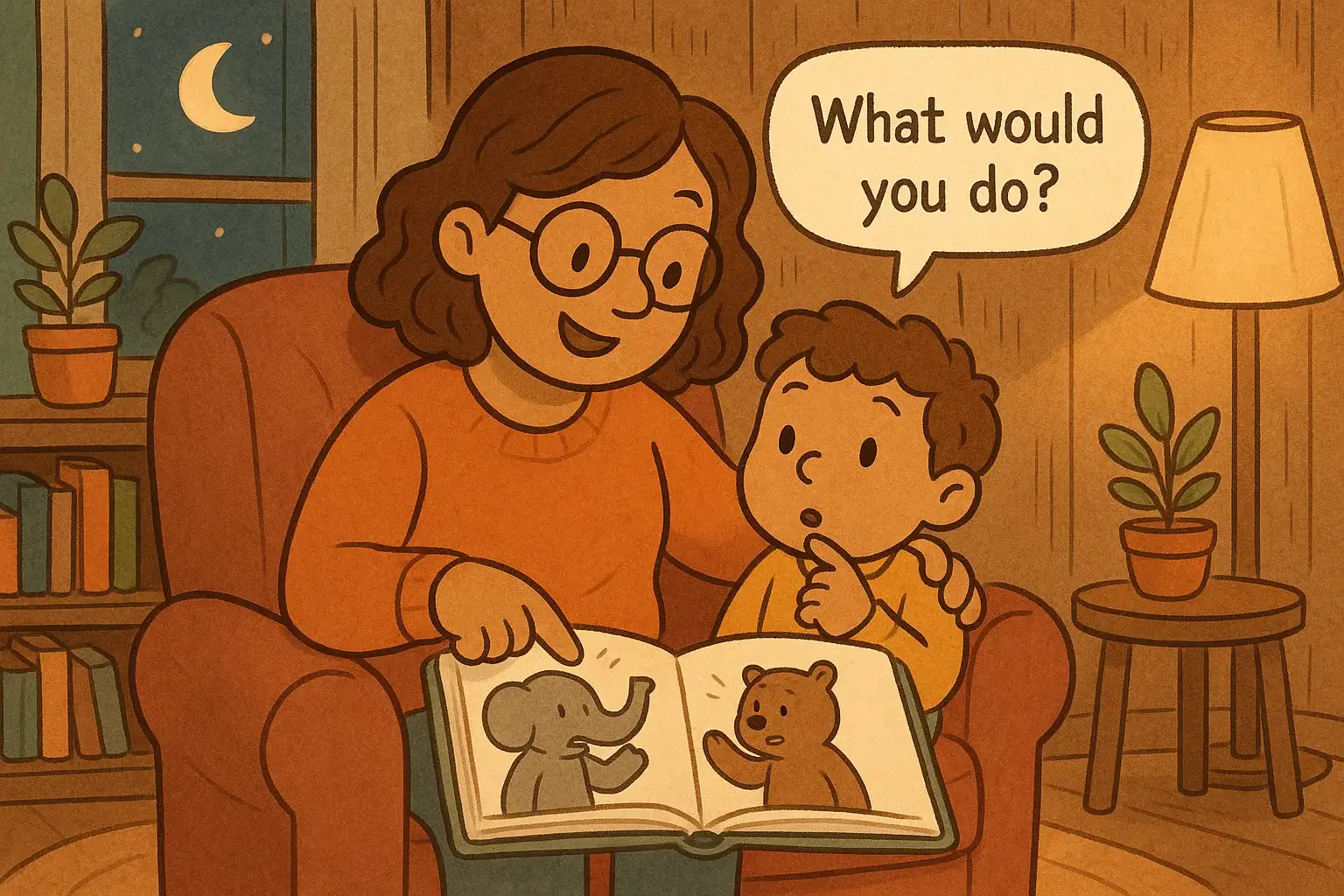
Books are a wonderful tool for exploring complex social situations in a way that children can understand. Stories about friendship, sharing, and resolving conflicts can provide valuable social skills lessons and show kids positive solutions.
Tips for using books to teach social skills:
- Choose Relevant Stories: Look for books that address specific social skills your child may be working on, such as making friends or dealing with jealousy.
- Talk About the Story: After reading, have a conversation about the characters’ choices. Ask questions like, “What could the squirrel have done differently?” or “How did the friends solve their problem?”
- Connect to Real Life: Help your child relate the story to their own experiences. You could say, “That reminds me of when you and your cousin both wanted the same toy. What did you do?”
9. Introduce Mindfulness for Emotional Regulation
Mindfulness practices can help children learn to pause and respond thoughtfully rather than reacting impulsively in social situations. These techniques are particularly helpful for managing big emotions and are among the skills necessary to keep your child calm under pressure.
Simple mindfulness exercises for kids include:
- Belly Breathing: Have your child lie down and place a stuffed animal on their belly. Ask them to watch the animal rise and fall as they breathe in and out slowly.
- “Pizza” Breathing: Tell them to breathe in deeply as if smelling a delicious pizza, and then breathe out slowly to cool it down.
- Body Scan: Ask them to notice how different parts of their body feel, from their toes to their head.
Incorporating these short practices into daily routines, such as before bedtime, can help children develop greater self-awareness and emotional control.
10. Provide Real-World Social Experiences
Ultimately, social skills are best learned when children practice them in real-world settings. Creating opportunities for your child to interact with others, whether at a park or in a child care setting, is essential for their social development.
- Arrange Playdates: Playdates provide a valuable setting for children to practice skills like sharing, communication, and conflict resolution in a relaxed environment.
- Engage in Community Activities: Volunteering, joining a sports team, or participating in a club can help older kids practice cooperation and teamwork.
- Practice in Public: Outings to the park or library are great opportunities to practice social etiquette, such as waiting in line, speaking politely to others, and being aware of personal space—an important skill related to social distancing awareness. Let your child practice their social skills whenever possible.
By providing a supportive environment and actively using these evidence-based social skills strategies, you can help your child build the confidence needed to form positive relationships and navigate the social world.
Frequently Asked Questions
At what age should I start teaching my child social skills?
You can start teaching social skills from a very young age. Children as young as one or two begin to learn by watching you. Simple concepts like sharing and being gentle can be introduced as soon as toddlers learn to interact. Formal social skills lessons, like turn-taking in games, are often effective starting around ages three and four.
How can I help my shy child practice social skills?
For a shy child, start small. Begin with one-on-one playdates in a familiar environment, like your home. Role-playing social scenarios before an event can also reduce anxiety. It is important to let your child move at their own pace and never force them into uncomfortable situations. Celebrate small victories, like saying “hello” to another child.
Are social skills activities different for toddlers versus older kids?
Yes, the activities should be age-appropriate. For toddlers, the focus is on foundational skills like sharing, taking turns, and simple greetings, often taught through parallel play and modeling. For older kids, activities can be more complex, focusing on conflict resolution, empathy, perspective-taking, and nuanced verbal communication skills through team sports, group projects, and deeper conversations.
What are some simple social skills lessons I can do at home?
Family dinner is a fantastic daily opportunity to practice active listening and turn-taking in conversation. Playing board games teaches fairness and emotional regulation. Reading books about friendship and discussing the characters’ feelings helps build empathy. Even simple chores done together can foster cooperation skills.
How do I know if my child's social skill development is on track?
Most children develop social skills at their own pace, but there are general milestones. By preschool, children often show interest in playing with other kids and can take turns. By early elementary school, they typically begin to understand others’ feelings and can cooperate in groups. If you have concerns about your child’s social skills, it’s always best to speak with their teacher, child care provider, or a pediatrician.

